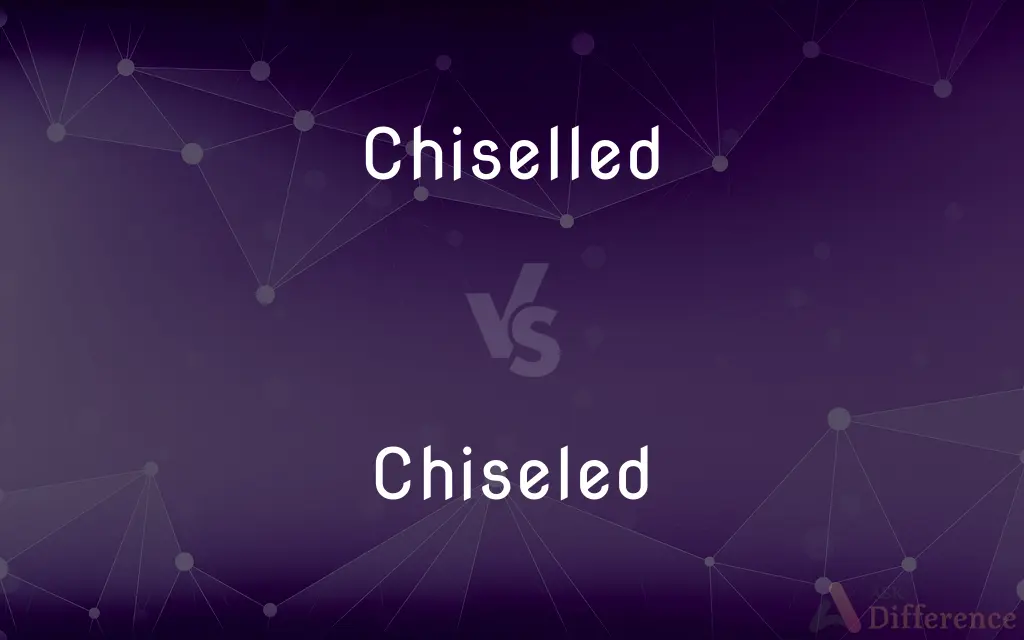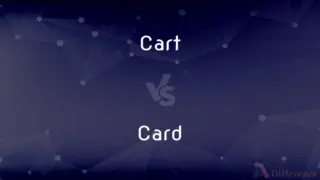Chiselled vs. Chiseled — What's the Difference?
By Tayyaba Rehman & Urooj Arif — Updated on April 23, 2024
Chiselled and chiseled both refer to the sculpted appearance of something, typically a body or features, but differ primarily in spelling; "chiselled" is preferred in British English, while "chiseled" is used in American English.

Difference Between Chiselled and Chiseled
Table of Contents
ADVERTISEMENT
Key Differences
The term "chiselled" is commonly used in British English to describe something that has been shaped or sculpted with a chisel, conveying precision and clarity in craftsmanship. Whereas "chiseled" serves the same function in American English, emphasizing a refined, well-defined finish.
In describing physical features, particularly a well-defined jawline or facial structure, "chiselled" evokes imagery of sharp, angular contours, similar to those carved by a sculptor's tool. On the other hand, "chiseled" in American contexts suggests a rugged yet finely detailed appearance, often used to describe attractive physical traits in men.
When applied to bodybuilding and fitness, "chiselled" implies a body that is extremely toned and muscular, with very low body fat, revealing the underlying muscle definition. On the other hand, "chiseled" in American gyms and fitness magazines might be used to describe similar physical attributes, underscoring the hard work and discipline required to achieve such a physique.
In artistic contexts, "chiselled" might be used to describe precise and delicate features of sculptures or engravings that show the detailed work of an artist. Whereas "chiseled" could also refer to these artistic techniques in American English, highlighting the artist’s skill in bringing out lifelike qualities through stone or wood.
In literature, British authors might use "chiselled" metaphorically to describe sharply defined character traits or meticulously crafted narratives. On the other hand, American writers using "chiseled" could be focusing on the strong and clear expression of themes or characters, crafted with a figurative sculptor’s precision.
ADVERTISEMENT
Comparison Chart
Spelling
Chiselled
Chiseled
Usage Context
Preferred in UK and related territories
Preferred in the USA and related regions
Literary Usage
Used to describe detailed and sharp narratives or features
Used similarly, but with American spelling
Artistic Connotation
Describes detailed, sculpted work in art
Similar use, emphasizing fine details
Physical Description
Often describes sharply defined physical traits, like facial features or muscular bodies
Similar, but also implies rugged, strong features
Compare with Definitions
Chiselled
Having a sharply defined, sculptured physical appearance.
The actor had a chiselled jawline that suited heroic roles.
Chiseled
Marked by clear, sharp, and distinct features.
His chiseled features made him a popular model.
Chiselled
Used to imply crafted with skill and precision.
The jeweler chiselled the gemstones with remarkable accuracy.
Chiseled
Used figuratively to express clear and sharp narrative or style.
The screenplay was chiseled with compelling dialogue.
Chiselled
Defined or shaped by cutting with a chisel.
The sculptor chiselled fine details into the marble statue.
Chiseled
Implying refined and meticulous craftsmanship.
The carpenter’s chiseled handiwork was evident in the furniture’s fine detailing.
Chiselled
Precisely formed or sharply defined in shape or profile.
He has a chiselled physique that is ideal for fashion modeling.
Chiseled
Shaped or cut with a chisel.
The artist chiseled a beautiful figure from a block of limestone.
Chiselled
Metaphorically, to describe something clear-cut or distinctly outlined.
The novel's plot was as chiselled as a Greek sculpture.
Chiseled
Describing a physical appearance that is impressively sculpted.
The bodybuilder’s chiseled abs were the highlight of the competition.
Chiselled
(of wood or stone) shaped or cut with a chisel
The squared shapes of the chiselled stone
Chiseled
Made or shaped with or as if with a chisel
A finely chiseled nose.
Chiselled
Made or shaped with or as if with a chisel
A finely chiseled nose.
Chiseled
(US) Having strongly defined facial features.
Chiselled
A metal tool with a sharp beveled edge, used to cut and shape stone, wood, or metal.
Chiseled
(of a physique) Having well-developed muscles with minimal bodyfat.
Chiselled
To shape or cut with a chisel.
Chiseled
(US) chisel
Chiselled
To cheat or swindle.
Chiseled
Having a clean and distinct outline as if precisely cut along the edges;
A finely chiseled nose
Well-defined features
Chiselled
To obtain by deception.
Chiselled
To use a chisel.
Chiselled
To use unethical methods; cheat
"who's up, who's down and who's chiseling on the side" (James Reston).
Chiselled
To intrude oneself without welcome
Always tries to chisel in on our conversations.
Chiselled
(British) chisel
Chiselled
(British) chiseled
Common Curiosities
Is there a difference in how "chiselled" and "chiseled" are used in literature?
No significant difference, both describe sharp, well-defined qualities, but the spelling varies by region.
Are there professions where "chiselled" or "chiseled" might be used more frequently?
Yes, in professions related to art, sculpture, and fitness, these terms are commonly used to describe precision and definition.
What is the primary difference between "chiselled" and "chiseled"?
Chiselled is the British English spelling, while chiseled is the American English spelling.
Can "chiselled" and "chiseled" be used interchangeably?
Yes, they can be used interchangeably depending on the regional spelling preference.
Is there a difference in pronunciation between "chiselled" and "chiseled"?
No, both words are pronounced the same way despite their different spellings.
In which contexts might you use "chiselled" or "chiseled" outside of describing physical appearance?
These terms can also be used metaphorically to describe anything that is well-defined or meticulously crafted, such as a piece of writing, a strategy, or a performance.
How should writers choose between "chiselled" and "chiseled"?
Writers should choose based on the version of English (British or American) they are using in their writing.
Is "chiselled" more commonly used in British literature compared to "chiseled"?
Yes, "chiselled" is more commonly used in British literature, aligning with British spelling conventions, whereas "chiseled" is prevalent in American texts.
Can "chiselled" or "chiseled" be used in a negative context?
Typically, these terms are used positively to denote attractiveness or precision; however, they could be used negatively to imply excessive sharpness or harshness in appearance or style.
What does it mean when someone is described as having a "chiselled" or "chiseled" face?
This description typically refers to someone with distinctly sharp and angular facial features, such as a strong jawline, prominent cheekbones, and a well-defined chin.
Do "chiselled" and "chiseled" have any synonyms that are used interchangeably in the same contexts?
Yes, terms like "sculpted", "carved", and "defined" can serve as synonyms in similar contexts, particularly in describing physical traits.
What impact does using "chiselled" or "chiseled" have in descriptive writing?
Using these terms in writing helps create a vivid, clear image of sharpness and precision, enhancing the visual impact of the description.
Share Your Discovery

Previous Comparison
Cart vs. Card
Next Comparison
Hoarfrost vs. FrostAuthor Spotlight
Written by
Tayyaba RehmanTayyaba Rehman is a distinguished writer, currently serving as a primary contributor to askdifference.com. As a researcher in semantics and etymology, Tayyaba's passion for the complexity of languages and their distinctions has found a perfect home on the platform. Tayyaba delves into the intricacies of language, distinguishing between commonly confused words and phrases, thereby providing clarity for readers worldwide.
Co-written by
Urooj ArifUrooj is a skilled content writer at Ask Difference, known for her exceptional ability to simplify complex topics into engaging and informative content. With a passion for research and a flair for clear, concise writing, she consistently delivers articles that resonate with our diverse audience.














































